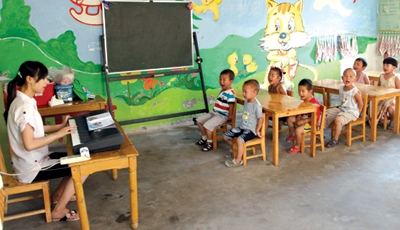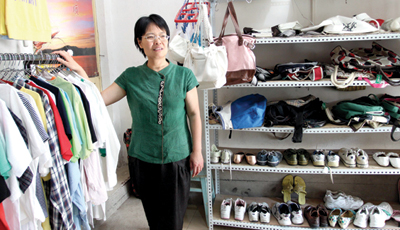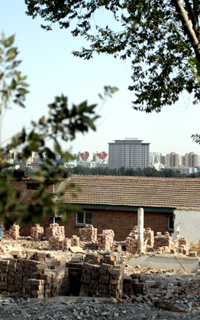 |
Large Medium Small |
|
 Some preschool children at the center for migrant children in
Yongwangfu, a village outside Beijing's west Fifth Ring Road.
Photos By Liu Zhe / China Daily |
The village of Yongwangfu will soon be bulldozed to make way for fancy villas. But one woman is determined the lives of its migrant workers will not become part of the rubble. Lin Qi reports
Like many other villages on the outskirts of Beijing, Yongwangfu, too, is about to disappear. The hillside village, home to thousands of seniors and migrant families, will soon give way to rows of fancy villas.
The village alleys, which wind down from a bus stop on the main road, used to be tranquil and clean. Now there is rubble everywhere; piles of discarded furniture have become homes to stray dogs.
On one of the hottest days in Beijing, Ma Xiaoduo, founder of Hope Home, a non-profit organization that brings together migrant women, is carrying out her regular community survey in the village.
She encounters Zhang Xia. Zhang and her family live in a large courtyard that houses rows of single-story houses. A former pigsty, the courtyard accommodates about 1,000 rural migrants like Zhang.
A native of Henan province, Zhang and her husband, a fruit vendor, have been living in the courtyard for five years. Their eldest son, 7, goes to a nearby migrant school, and the youngest, 5, attends a children's center opened by Hope Home. Both schools will soon be shut down.
Zhang confides in Ma her anxiety over her younger son, whose persistent low-grade fever has already cost the family 2,000 yuan in medical expenses. She is also worried about the children's schooling if they have to move.
More migrant residents stop Ma to pour out their concerns for the future. She has no comforting words for them. Her office too will soon be closed, and all her efforts to unite this migrant community over the past four years will come to nothing.
Ma empathizes with the great difficulties rural migrant face to be accepted in the cities where they struggle for a better life.
She was one of them.
|
 Ma Xiaoduo, founder of Hope Home, at the village store, which sells second-hand clothes, shoes, toys and other household appliances. |
In 1982, Ma, then 16, left her hometown in Jiangsu province and landed a job as a domestic helper in Beijing. She fell for a Beijing native but the couple faced huge social pressure because Ma was a stranger from the countryside. And she did not have the registered permanent residence, or hukou, in Beijing.
Wanting a city - any city - hukou, Ma moved to Shenzhen, when she heard it would loosen restrictions on the permanent residence policy. She got her Shenzhen hukou and finally married. But she feels she "will never have a sense of belonging in cities".
Wanting to do something for the growing migrant community, in 1999 Ma joined the Beijing-based Migrant Women's Club, a non-governmental organization that aims build a social network for migrants and provide them with legal and emotional support.
In 2005, she founded Hope Home, with the objective of discovering women leaders in migrant communities and motivating them to become a major force in community development.
Ma set up an office in Yongwangfu. The village outside Beijing's west Fifth Ring Road has a migrant population of roughly 30,000, 10 times the number of local villagers, mostly seniors.
She started by offering free lectures on family, health and sanitary issues. "At first people were suspicious. Their first experience of city life was usually getting cheated. But with the help of the villagers' committee, the lectures slowly began to draw in the crowds," she says.
She came across several lonely yet enthusiastic housewives in her audience. So she opened a store selling second-hand clothes, shoes, toys and other household appliances, which she sourced and collected.
"The village had no clothing shops, only grocery stores. People had to walk 40 minutes to buy a T-shirt on which they would spend at least 20 yuan ($3)," Ma says.
She explains that a migrant family usually spends several hundred yuan on rental. Since they don't have a hukou, they pay twice as much for water and electricity as native residents; when their liquefied gas cylinders run out, they cannot exchange them for a full one by paying 40 yuan ($5.9), at the public service station. Instead, they have to buy from private, unlicensed gas providers, who charge 140 yuan. Most cannot afford a shower, which costs 7 yuan, at the public bath in the village.
Ma persuaded Song Chaolian, a migrant woman from Henan, to manage the store. Song and her family moved to the village 10 years ago. Other than doing housework and taking care of children, she spent most of her time watching TV.
Now Song comes to the store every afternoon. She cleans, irons and repairs the newly-donated clothes. She sometimes also makes shoe-pads from clothes that are not fit to sell and gives them to construction workers on nearby sites.
The clothes sell for between 3 and 6 yuan. The store's earnings are used for community services and charity, in addition to paying the rental.
|
 Yongwangfu, home to thousands of seniors and migrant families, will soon give way to rows of fancy villas. |
But more importantly, Ma says the store serves as a place where migrants can share their sorrows and support each other.
When she first came to Yongwangfu, Ma found that migrant families have two or three kids on average. They were kept at home before being sent to primary school. Ma rented a single-story house and converted it into a center for migrant children. The kids who used to be timid and turn their heads away when visitors talked to them, now sing and perform a play for city children during festivals.
But it is the migrant women who have changed the most over the past four years, Ma says.
Many women, particularly housewives, felt inferior to their husbands, because they made less or no money.
Now women like Li Xiaojing, a talented painter, is one of the most popular teachers at the center. The self-taught woman passed the college entrance examination and majored in pre-school education.
Ma says she will stay till the last migrant family leaves the village. Then she will continue her work in another migrant community.
"These people are like seeds. I hope they can transplant our experiences here in Yongwangfu in other migrant communities they will move to," she says.